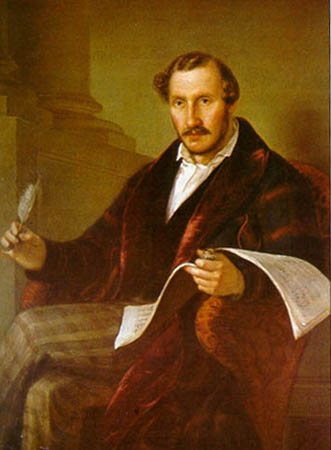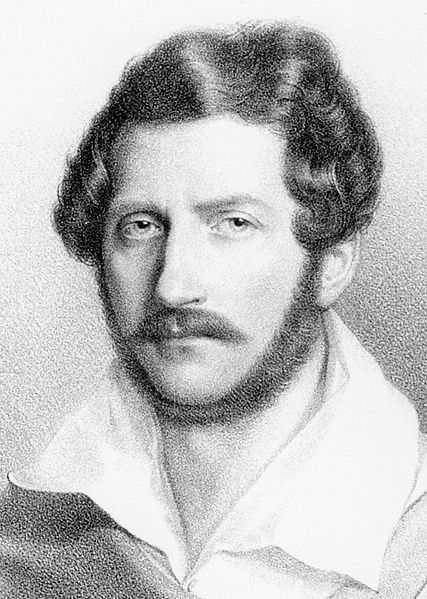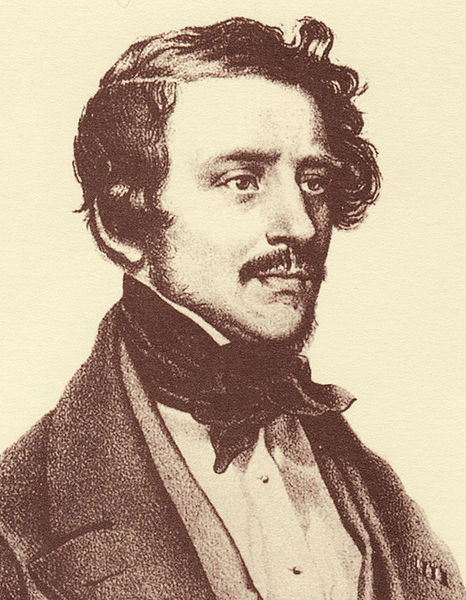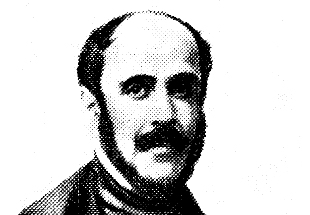<Back to Index>
- Composer Domenico Gaetano Maria Donizetti, 1797
- Poet and Librettist Giovanni Ruffini, 1807
PAGE SPONSOR



Domenico Gaetano Maria Donizetti (29 November 1797 – 8 April 1848) was an Italian composer from Bergamo, Lombardy. His best known works are the operas L'elisir d'amore (1832), Lucia di Lammermoor (1835) and Don Pasquale (1843), all in Italian, and the French operas La favorite and La fille du régiment (both from 1840). Along with Vincenzo Bellini and Gioachino Rossini, he was a leading composer of bel canto opera.
The youngest of three sons, Donizetti was born in 1797 in Bergamo's Borgo Canale quarter located just outside the city walls. His family was very poor with no tradition of music, his father being the caretaker of the town pawnshop. Nevertheless, Donizetti received some musical instruction from Simon Mayr, a German composer of internationally successful operas who had become maestro di cappella at Bergamo's principal church in 1802.
Donizetti was not especially successful as a choirboy, but in 1806 he was one of the first pupils to be enrolled at the Lezioni Caritatevoli school, founded by Mayr, in Bergamo through a full scholarship. He received detailed training in the arts of fugue and counterpoint, and it was here that he launched his operatic career. After some minor compositions under the commission of Paolo Zancla, Donizetti wrote his ninth opera, Zoraida di Granata. This work impressed Domenico Barbaia, a prominent theater manager, and Donizetti was offered a contract to compose in Naples. Writing in Rome and Milan in addition to Naples, Donizetti achieved some popular success in the 1820s (although critics were often unimpressed), but was not well known internationally until 1830, when his Anna Bolena was premiered in Milan. He almost instantly became famous throughout Europe. L'elisir d'amore, a comedy produced in 1832, came soon after, and is deemed one of the masterpieces of 19th century opera buffa (as is his Don Pasquale, written for Paris in 1843). Shortly after L'elisir d'amore, Donizetti composed Lucia di Lammermoor, based on the Sir Walter Scott novel The Bride of Lammermoor. It became his most famous opera, and one of the high points of the bel canto tradition, reaching stature similar to Bellini's Norma.
After the success of Lucrezia Borgia (1833) consolidated his reputation, Donizetti followed the paths of both Rossini and Bellini by visiting Paris, but his opera Marin Faliero suffered by comparison with Bellini's I puritani, and he returned to Naples to produce his already mentioned masterpiece, Lucia di Lammermoor. As Donizetti's fame grew, so did his engagements, as he was further hired to write in both France and Italy. In 1838, he moved to Paris after the Italian censor objected to the production of Poliuto (on the grounds that such a sacred subject was inappropriate for the stage); there he wrote La fille du régiment, which became another success.
As a conductor, he led the premiere of Rossini's Stabat Mater.
Donizetti's wife, Virginia Vasselli, gave birth to three children, none of whom survived. Within a year of his parents' deaths, his wife, on 30 July 1837, died from cholera. By 1843, Donizetti exhibited symptoms of syphilis and probable bipolar disorder. After being institutionalized in 1845, he was sent to Paris, where he could be cared for. After visits from friends, including Giuseppe Verdi, Donizetti was sent back to Bergamo, his hometown. After several years in the grip of insanity, he died in 1848 in the house of the noble family Scotti. After his death Donizetti was buried in the cemetery of Valtesse but in the late 19th century his body was transferred to Bergamo's Basilica of Santa Maria Maggiore near the grave of his teacher Simon Mayr.
Donizetti is best known for his operatic works, but he also wrote music in a number of other forms, including some church music, a number of string quartets, and some orchestral works.
He was the younger brother of Giuseppe Donizetti, who had become, in
1828, Instructor General of the Imperial Ottoman Music at the court of
Sultan Mahmud II (1808 – 1839).

Giovanni Ruffini (1807, Genoa - 1881) was an Italian poet of the early 19th century. He is chiefly known for having written the draft of the libretto of the opera Don Pasquale for its composer Gaetano Donizetti.
Ruffini was from Genoa. He had been condemned to death as an enemy of the state and was living in exile in Paris in 1842 when it was suggested to him that he might offer his services to Donizetti as a librettist. Donizetti told him exactly what he required for his latest opera project, Don Pasquale, but not that he intended to re-use music already written for other purposes. Ruffini duly wrote the draft libretto, but Donizetti changed so much of the text, to fit his existing music, that Ruffini became angry at the alterations, and refused to allow his name to be mentioned in the program for the première at the Théâtre Italien in Paris 3 January 1843.